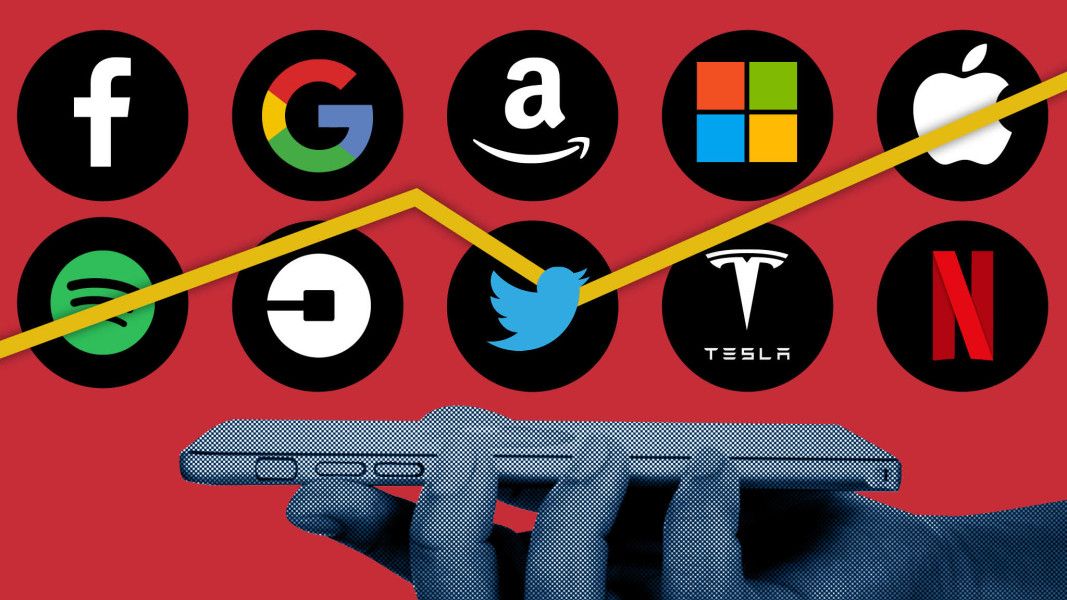Big Tech has thrived during the global pandemic, but faces new antitrust scrutiny

A few minutes every morning is all you need.
Stay up to date on the world's Headlines and Human Stories. It's fun, it's factual, it's fluff-free.
As the coronavirus pandemic continues to sweep across the United States, businesses in numerous sectors have been devastated by the accompanying economic fallout.
However, the country’s biggest tech companies have proven to be more resilient.
With much of the world stuck at home under stay-at-home orders, people have been more reliant on technology than ever before.
With many retail stores closed and consumers opting not to go to grocery stores, Amazon has had to deal with a significant increase in demand and has hired over 100,000 warehouse workers to help do so.
Cloud computing services offered by Microsoft, Google and Amazon have also seen an uptick in demand with millions across the country working from home.
Facebook’s shares rose 10% in April, recovering from a slump caused by a decline in ad revenue. Netflix saw substantial growth, adding 16 million new subscribers in the first three months of the year, which doubled the company’s predicted quarterly growth for 2020.
Big Tech has also used their resources to help solve challenges caused by the pandemic.
Microsoft donated 240,000 surgical masks and 3,000 bottles of hand sanitizer to Washington state, in addition to other supplies. The company also donated 114,000 packed lunches which were distributed to schools, low income housing centers and food banks.
With contact tracing a crucial part of health authorities’ efforts to limit the spread of the disease, Amazon and Google have partnered to build a COVID-19 contract tracing system for iOS and Android mobile phones that lets users know when they have come into contact with someone who’s tested positive for the virus.
Acquisitions during the pandemic
As other companies struggle to stay afloat with revenue evaporating, Big Tech’s big money has kept them largely unscathed. The economic uncertainty caused by the pandemic is proving to be ideal for tech giants to make strategic investments and acquisitions, with companies selling at reduced valuations.
Apple has bought three companies since the start of the COVID-19 outbreak: weather app Dark Sky, Ireland-based speech recognition startup Voysis and virtual reality event streaming company NextVR.
Amazon and Facebook both invested in Indian companies, with Amazon investing US$3.8 million in online marketplace BankBazaar and US$15 million in lending startup Capital Float, while Facebook bought a 9.99% stake in Jio, India’s largest mobile operator, for US$5.7 billion.
On Friday, Facebook announced that it was acquiring Giphy for around US$400 million. Giphy is a popular GIF search engine that is integrated into social media and messaging services like TikTok, Twitter, Tinder, Slack and iMessage.
Facebook’s announcement raised antitrust concerns, with some worried that Facebook will use Giphy for insight into how users engage with competitor’s social platforms.
For several years, the public and lawmakers have scrutinized Big Tech over anti-competitive behavior and privacy violations.
Facebook’s Giphy announcement followed reports that ride-hailing and food delivery company Uber is in talks to buy Grubhub. If that deal goes through it will give Uber the chance to become a truly dominant force in food delivery across the US.
Uber’s takeover bid also drew antitrust scrutiny with regulators expected to inspect the deal. US Rep. David Cicilline, a Democrat from Rhode Island and the chairman of the House Judiciary Committee’s antitrust subcommittee, has spoken out against the deal.
“Uber is a notoriously predatory company that has long denied its drivers a living wage,” Cicilline said in a statement.
“Its attempt to acquire Grubhub — which has a history of exploiting local restaurants through deceptive tactics and extortionate fees — marks a new low in pandemic profiteering.”
While tech giants have seen their profit margins increase during the lockdown, lawmakers like Cicilline, who is currently leading a sweeping investigation into the tech sector, continue to look into whether these tech companies are abusing their power.
On Friday, The Wall Street Journal reported that the Department of Justice and a group of state attorneys general are in the process of filing antitrust lawsuits against Google.
US lawmakers attempt to halt acquisitions
In April, Cicilline proposed a moratorium on corporate mergers and acquisitions, which would only allow them to take place if a company was about to fail or was already in bankruptcy.
Congressional Democrats have since continued to push for it.
Massachusetts Senator Elizabeth Warren and New York Representative Alexandria Ocasio-Cortez announced plans to introduce the “Pandemic Anti-Monopoly Act,” which would temporarily block many corporate mergers and acquisitions from companies with more than US$100 million in revenue and those owned by private equity or hedge funds.
Investment firms have argued that private equity should be allowed to operate freely.
“Without private capital, more companies will fail,” Blackstone President Jonathan Gray wrote in the Financial Times.
“Even with private participation, there will not be enough cash to save every company and worker. But at least there exists a $1.45tn potential lifeline of capital from non-bank lenders and private equity firms, funded mostly by public pension plans,” Gray wrote.
“Private capital is stepping in to give companies including Airbnb, United Airlines and Expedia a fighting chance.”
Have a tip or story? Get in touch with our reporters at tips@themilsource.com
Sign up for daily news briefs from The Millennial Source here!




Comments ()